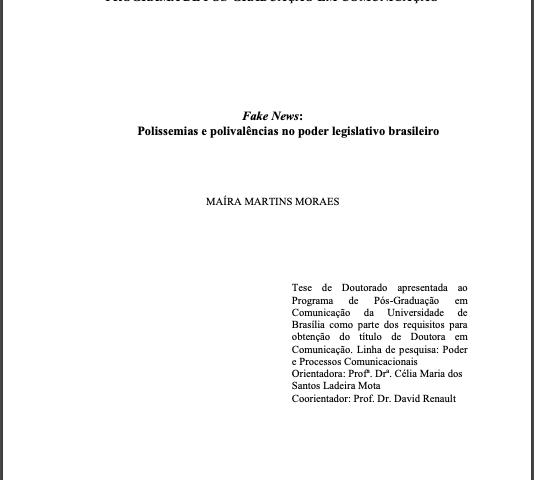The Influence of Federal Institutions of Higher Education (IFES) on Budget Decisions in the National Congress: The Case of the University of Brasília (UNB) from 2000 to 2009
11 de August de 2021
Opinions for Sale: Political Oppositions and Division of Intellectual Labor in the Media
3 de December de 2021In this study, we propose a problematization of the expression fake news as a discursive event that has emerged from several institutions. For this, we elaborated a genealogy from the Brazilian Legislative Power, leading us to understand the power disputes and the discourse produced within the instances of the Social Communication Council (CCS), active between November 8, 2017 and November 4, 2019; and of the Joint Congressional Investigating Committee (CPMI), established on September 4, 2019. To contribute to a theoretical elaboration, we approached thoughts related to the economy of truth, we systematized academic definitions about the fake news concept and mapped proposed bills in Brazil since 2017 indexed on this theme. What we find in the archives, in addition to polysemy, is the strategic polyvalence of the expression fake news. Otherwise, its power of circulation, adhesion and agency in territories sometimes seen as antagonistic, in opposing groups, circulating from one to another as a form of power, drawing attention to the strategic instability of the production of discourses. Would it not be surprising then, that in Brazil the defense of press freedom, the free association of people and the guarantee of freedom of expression were discursive practices of self-referred “right-wing conservative” groups? If in the CCS what emerges from the documents against the background of fake news is an effort to correct the historical role of the Council, which was weakened in the articulations of the process of the Constituent Assembly in the 1980s. In the CMPI of fake news, the expression is carried over in the territory of defending democracy and protecting rights such as communication. In this mechanism, honor is a shared distinctive value, but the practical management of values through democracy in this historical moment is the responsibility of a new group of power that is distinguished by its competence in technological and communication management, shed light on an algorithmic governmentality.
Author: Maíra Martins Moraes
Source: http://www.realp.unb.br/jspui/handle/10482/42239

